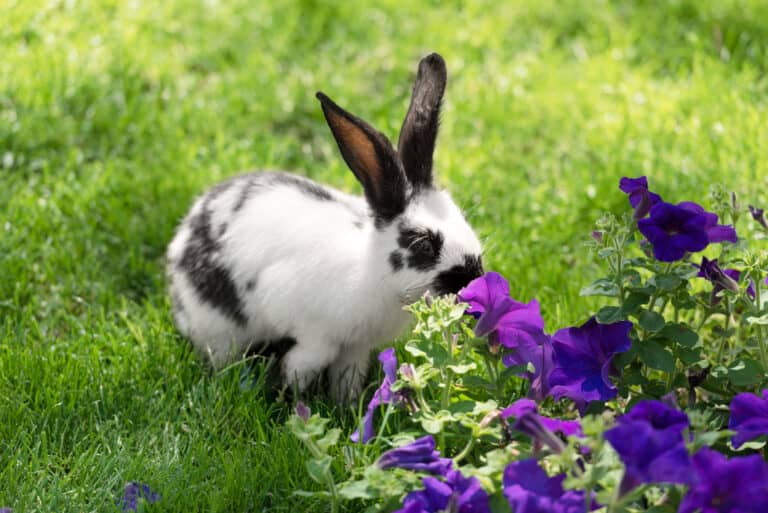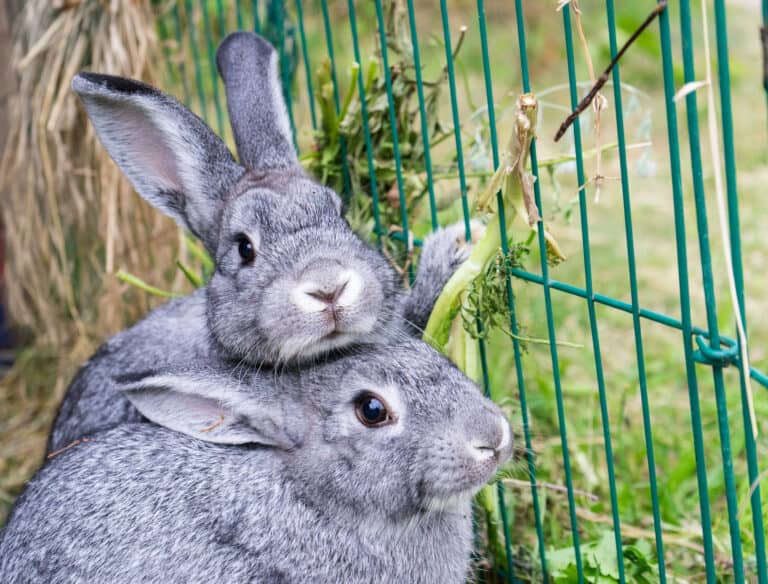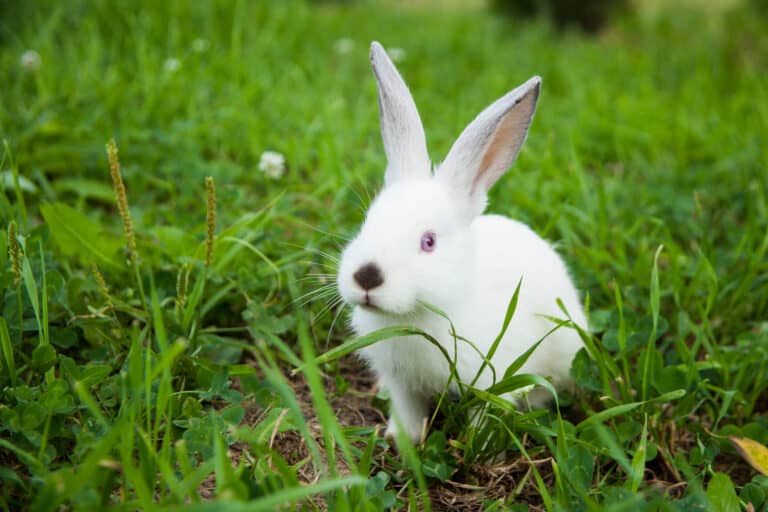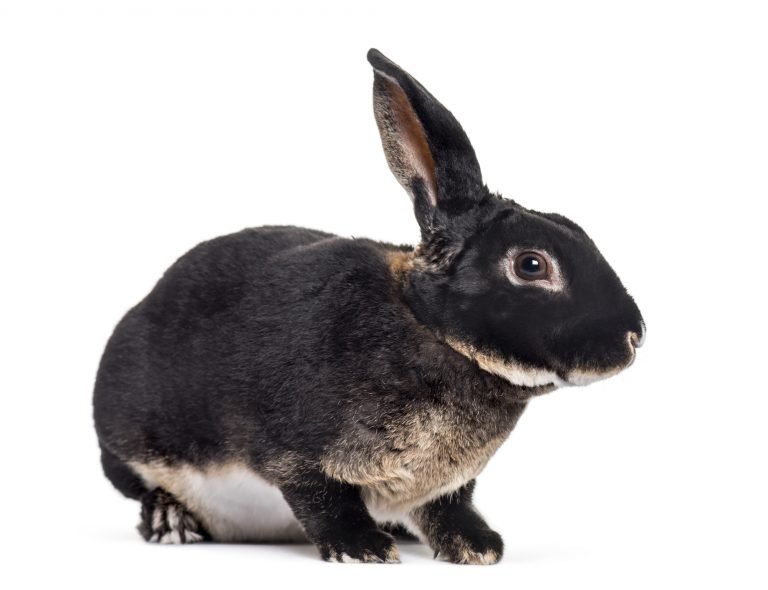All About Bunnies with Red Eyes: Why and How They Get Red Eyes

Like humans, rabbits come in all shapes, sizes, and, you guessed it, eye colors. Those heart-melting peepers come in a variety of shades and hues, from blue to dark brown. You might even come across bunnies with red eyes, who’ll undoubtedly be head-turners, as rabbits with red eyes are rare.
If you’ve seen a rabbit with this stunning shade, you must have wondered about the cause. To satisfy your curiosity, let’s talk about these charming furballs with the unique look that sets them apart from their bunny buddies.
Bunnies With Red Eyes: Key Take-Aways
These are the key things to know about rabbits with red eyes (albino rabbits):
Why Do Bunnies Have Red Eyes: Rabbits with red eyes are called albino rabbits. A rabbit with albinism lacks a pigment called melanin, which is responsible for giving color to the hair, skin, and eyes. It’s a rare condition.
Are Red Eyed Rabbits in Poor Health? Albinism is not a sign of poor health. Bunnies with red eyes are as healthy as any other rabbit.
Rabbit Breeds With Red Eyes: The Californian and Himalayan rabbits, Florida White and New Zealand White rabbits will always have red eyes. Angoras, Lionheads and Netherland Dwarfs will sometimes have red eyes.

Why Do Some Bunnies Have Red Eyes?
Rabbits with red eyes are not just any ordinary bunnies. They belong to a specific group called albino rabbits. Albinism is a genetic condition that affects the pigmentation of an animal (and even humans). A rabbit with albinism lacks a pigment called melanin, which is responsible for giving color to the hair, skin, and eyes.
The absence of melanin in a bunny with red eyes allows you to see the underlying blood vessels more clearly, giving those peepers that reddish appearance. It’s like looking through a transparent window where you can see the blood vessels at the back of the eye.
Now, why do some rabbits end up with albinism and those distinctive crimson-tinged eyes? Well, it all comes down to their genes. Albinism is often an inherited trait, meaning that if a rabbit mom or dad carries the albino gene, there’s a chance their little offspring will be born with red eyes.
However, not all rabbits with red eyes are albinos. Some rabbits may have red eyes due to other factors, such as a condition called “pink eye” or, as we discuss in the this article on eye infections, or there could be an underlying disease. These cases differ from albinism as they usually involve inflammation or infection.
Is Red Eyes in Rabbits a Sign of Poor Health?
Albinism is not a sign of poor health; for the most part, a bunny with red eyes is as healthy as any other rabbit. But we mentioned that sometimes, other conditions cause red eyes, such as irritation, allergies, infections, or even stress. In such instances, eye redness can indicate underlying health issues.
If you notice redness in your rabbit’s eyes, monitor his behavior and look for other symptoms of illness. These include excessive tearing, discharge, sneezing, or changes in appetite or activity levels.
Albino Bunny Breeds With Red Eyes
Any rabbit can have the albino gene, so all buns have the potential to have red eyes. However, some rabbit breeds are selectively paired to carry the gene that causes albinism. As such, some bun types will almost always have red eyes, while with others, it’s a game of genetic roulette.
Rabbits That Will Always Have Red Eyes
Due to the wonders of selective breeding, a few rabbit types always sport the crimson hue when it comes to their peepers. Through careful selection and breeding of rabbits with reddish or pinkish pigmentation in their eyes, red-tinged peepers have become more prevalent in the following rabbit types:
1. Florida White Rabbit
This is the only bunny with red eyes and a pure white coat. The breed was initially created to be lab animals but has since become popular pets because of the bun’s gentle nature. Small, compact, with all-white fur and red eyes, this breed epitomizes the look of a typical bunny.
2. Californian and Himalayan Rabbit
These two bunny types have red eyes and white fur, but unlike the Florida White with pure white coats, the Californian and Himalayan bun sport dark markings in some areas of their bodies. These include the tail, feet, nose, and ears.
3. New Zealand White Rabbit
The quintessential Easter bunny, the New Zealand White, boasts a coat that’s as pure as freshly fallen snow. What’s interesting is how the red eyes and white fur combine to create a striking contrast. These bunnies are not only visually captivating but they’re also known for their friendly and docile nature. Check out our About page with pictures of our red-eyed rabbit!
Rabbit Breeds That Sometimes Have Red Eyes
Some rabbit breeds will have red eyes sometimes, meaning that not every bunny from the breed will sport a crimson tinge in their eyes. Moreover, these bun types usually don’t have pure white fur. Instead, their coat can exhibit multiple colorings.
The most common types that sometimes come with red eyes are the following:
1. Angora Rabbits
The largest bun breed recognized by the American Rabbit Breeders Association (ARBA), these buns are delightful furballs. An albino Angora is a sight to behold, resembling a fluffy cloud.
2. Lionhead
The distinctive wool fluff around its head gave this bun breed its name. The mane of Lionhead rabbits is unlike ordinary fur. It’s thick and dense and often appears longer around their neck, giving them that regal look.
3. Netherland Dwarf
One of the most striking features of Netherland Dwarf rabbits is their coat. It’s incredibly soft and plush. Their fur color ranges from solid shades like black, white, blue, and chocolate to more intricate patterns like harlequin, tortoiseshell, and sable point. Depending on the individual rabbit’s genetics, you might encounter a Netherland Dwarf bunny with red eyes.

Does a Rabbit with Red Eyes Need Special Care?
Albinism is not an ailment; rabbits with red eyes are as healthy as other bun breeds. That said, a ruby-eyed rabbit possesses traits that those without albinism don’t share.
Light Sensitivity
Rabbits with albinism lack pigmentation in their eyes. This means those peepers don’t have the usual protection that pigments like melanin offers, making them more susceptible to the intense glare of light.
For these furry creatures direct sunlight can be pretty harsh, causing discomfort and irritation to their sensitive eyes. A bunny with red eyes might squint, blink a lot, or even try to find shade to shield his peepers from that blazing ball of fire in the sky.
It’s not just sunlight that bothers these buns, though. Even indoor lighting can be too much for their eyes. If you have one of these red-eyed cuties as a pet, consider providing some shade or dimming the lights a bit to make him more comfortable.
Vision Impairment
The location of rabbits’ eyes (at the side of the head) lets them see almost around their head. However, this lessens their depth of field because most of what they perceive comes only from one eye.
To estimate the relative distance between objects, most rabbits perform something called parallaxing or scanning, where they move their heads slowly and deliberately from side to side to make up for their limited depth perception.
Red-eyed rabbits have weaker eyesight than their non-albino counterparts. This vision impairment makes it challenging for them to accurately judge distances, navigate their surroundings, and spot potential predators or obstacles.
Red-eye Infections in Rabbits
Don’t confuse albinism with a red-eye infection that can afflict rabbits with any eye color. Red-eye infection causes inflammation of the blood vessels in the eye, giving it a crimson tinge. Other symptoms include watery eyes, swelling, and bumps around the eyes.
Other causes of red eyes in rabbits include the following:
- Glaucoma
- Allergies
- Bacterial or fungal infections
- Conjunctivitis
Treating a Bunny With Red Eyes
The treatment for your fur baby’s red eyes will depend on the underlying cause. It may include the application of topical medication, systemic treatment with non-steroidal anti-inflammatories, and antibiotic therapy.
Consult your vet about the best way to treat your bunny’s red eyes.
Despite their distinctive appearance, rabbits with red eyes are just as adorable, lovable, and healthy as their pigmented counterparts. They do require a bit more care as their lack of pigmentation makes them more sensitive to sunlight and impairs their ability to see as clearly as their kin without albinism.
So if you have a bunny with red eyes, it’s essential to create a safe environment for him to explore and move around. Provide shade or dim the lights and remove obstructions to prevent potential injuries.
Red Eyed Rabbits FAQs
Not all white rabbits will have red eyes. Rabbits can have multiple different eye colors:
Brown
Blue
Black
Pink
Marbled
Red (Albino rabbits)
Bunnies have red eyes due to a genetic mutation known as albinism. They are perfectly healthy, but lack color pigment.
The Californian, Himalayan, Florida White, and New Zealand White will always have red eyes. The Angora, Lionhead and Netherland Dwarf will sometimes have red eyes.
Red-eye in rabbits is only related to albinism if the rabbit has white fur. So if the fur is any other color, like brown for example, then the red eyes are caused by a medical condition known as hyperemia. Sometimes, hyperemia is also called red-eye.
Unfortunately, albino rabbits don’t have a very long life in the wild. White fur doesn’t blend in very well and they often succumb to predators.
More About Rabbit Types
- How Big Do Holland Lop Rabbits Get? Complete Guide
- How Long Do Flemish Rabbits Live: Giant Breed Facts
- Are Rabbits Rodents? Find Out More About These Small Mammals
- How Long Do Holland Lop Rabbits Live?
- All About Bunnies with Red Eyes: Why and How They Get Red Eyes
We hope you enjoyed this post! If you did, will you give it a share or two 🙂 Thank you! ~from Every Bunny Welcome







